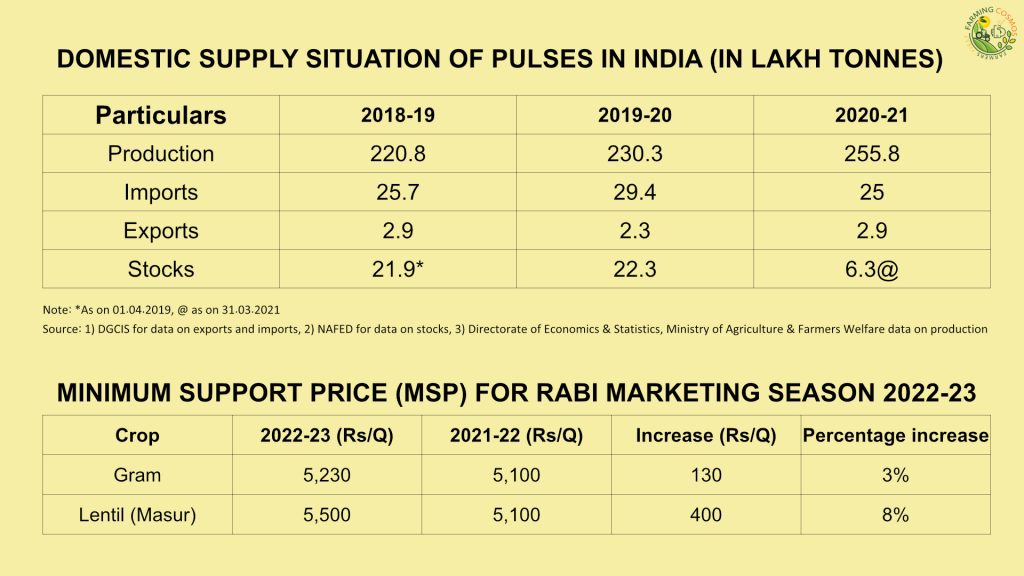Decline in state buying attributed to rise in market rates of pulses
The Commission for Agricultural Costs and Prices (CACP) has stated that as per the National Agricultural Cooperative Marketing Federation of India (Nafed) data, during the Rabi Marketing Season 2021-22 (RMS 2021-22) till June 30, 2021, the pulses procurement in India has been drastically reduced (around 70%) to only 6,27,500 tonnes as compared to previous season (21,43,300 tonnes) due to increase in market prices of major pulses compared to the minimum support prices (MSPs).
In its ‘Price Policy for Rabi Crops: The Marketing Season 2022-23’, CACP has mentioned procurement of gram increased sharply during RMS 2020-21 due to fall in market prices as the average market price remained about 10% below the MSP throughout the season. The total procurement was more than 21 lakh tonnes during RMS 2020-21, which is 19.3% of total gram production of the country.
CACP said, however, the procurement of gram was reduced to 5% of the total output in RMS 2021-22 due to the increasing trend in market prices. The share of procurement as percent of the total production ranged from 0.6% in Rajasthan to 11.6% in Gujarat, with an all-India average of about 5%, which is much lower than the existing procurement limit of 25% of production.
The state governments have been demanding enhancement of the procurement limit from 25% to 50% but it is evident that the existing limit of 25% is not binding for most states’ constraints. There is a need to strengthen procurement operations of pulses to ensure remunerative prices to farmers.
Smaller quantities of lentil were procured during the last three seasons. As per Nafed, only 20 tonnes of lentils have been procured in the country till June 30, 2021, while it was 1,400 tonnes in the RMS 2020-21 (see pic 1).

According to the CACP, production of pulses in the country has steadily increased in the last two years reaching a record high of 255.8 lakh tonnes in 2020-21 with an annual growth rate of about 11%. Amongst rabi pulses, production of gram is estimated to show a significant increase of about 14 percent in 2020-21 in comparison to the previous year while lentil production is expected to show a similar jump (14.6%).
CACP said increase in gram production is mainly due to higher output in Madhya Pradesh and Rajasthan. “Gujarat showed a 102% increase in gram output during RMS 2021-22. Uttar Pradesh continues to be the leading producer with about 38% share in total lentil production in India,” it mentioned.
The commission said supply of pulses in India is mainly driven by domestic production followed by a significant quantity of imports depending upon domestic deficits and international prices. Imports of pulses in 2020-21 is around 25 lakh tonnes, which is 15% lesser than the previous year imports of 29 lakh tonnes.
In case of stocks, due to lesser procurement of pulses in the recent marketing seasons, the stock availability of pulses has been reduced to 6.3 lakh tonnes in 2020-21 (see pic 2).

To read in Punjabi and Hindi, click below.

Pulses and oil seeds are a good alternative to wheat/paddy. It can surely help in diversification and bring good economic growth in the agriculture sector.